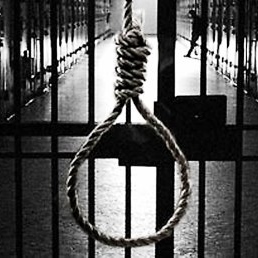click to dowload our latest edition
CLICK HERE TO SUBSCRIBE TO OUR NEWSLETTER


Published
7 years agoon
By
adminPAULA SLIER
Israeli Prime Minister Benjamin Netanyahu this week called for capital punishment to be re-instated. After years of opposing it, he said he supported it for a 19-year-old Palestinian who stabbed to death three members of a Jewish family who were celebrating the birth of a grandchild two Friday nights ago in the settlement of Halamish.
Israeli military law allows for courts to hand down the death penalty to someone convicted of murder, but sparingly. The decision must be unanimous, there must be a trial and the death sentence must be appealed even if the person convicted pleads guilty and doesn’t choose to appeal. But the defence establishment has so far opposed implementing the law and judges have held off from handing down such sentences.
Their concern is that it would encourage the kidnapping of Israelis who would later be used as bargaining chips for the release of people on death row. What’s more, opponents argue, there’s no evidence to support claims that capital punishment would serve as a deterrent.
To be fair, it does seem unlikely that someone planning to carry out a suicide attack would think twice because of the possibility of receiving a death sentence. No doubt, the international condemnation and hatred between Israelis and Palestinians would increase with its implementation.
Chatting to Israelis about what they think, many agree with Netanyahu’s new position. Supporters claim it would end the practice of releasing prisoners before they’ve served full sentences, a position Israel sometimes finds itself in, like when she freed 1 027 Palestinian prisoners for kidnapped Israeli soldier Gilad Shalit in 2011.
As one citizen told me: “They need to kill this terrorist (Hamas sympathiser Omar al-Abed who carried out the Halamish attack and is currently in Israeli custody) and throw his body in the sea. Like we did with Eichmann. There must be no grave, no sign, no place where people can come to, to make him a hero.”
While this conversation is still ongoing, thousands of citizens of the northern Israeli Arab city of Umm al-Fahm, turned out to bury the three young men killed after shooting dead two Israeli police officers at an entrance to the Al Aqsa Mosque. It was this event that triggered recent unrest.
In a precedent-setting case, the Supreme Court ruled to release their bodies after finding that the Israeli police did not have any authority to hold them. The court rejected the claim that the police were able to carry out “any action that is necessary” in order to maintain public order.
Israel has justified its policy of withholding Palestinian bodies killed by Israeli forces, on the basis that the funerals are used for propaganda and recruitment. The practice is widely condemned by rights groups as collective punishment and Israeli security officials have admitted it’s ineffective.
I interviewed a Bethlehem mother, four months after her son slipped out of home and tried to blow up a bus heading towards Jerusalem. He injured 20 people and later died from his wounds.
She had still not received his body and with tears in her eyes she told me: “It’s my right to have my son’s body back; the feeling of giving up this right is difficult.” Her son’s bedroom remained untouched.
I met the father of a 17-year-old boy whose body was returned four days after stabbing to death an Israeli woman and injuring another at a grocery store in a settlement, before being killed by a security guard. He tells me Israeli authorities never explained why they gave him his son’s body back.
“The funeral was not what we wanted or asked for,” he says, alluding to restrictions Israeli police can set, and the High Court has upheld, like how many people are allowed to attend and at what time the funeral can be held.
He continued: “It is our duty as living people to hold our sons on our shoulders and to take them to the soil.”
But Israeli soldiers still destroyed the family home, one of many I’ve visited and which the families are only too keen to show reporters. Destroying the murderer’s family home is another controversial deterrent that Israel employs.
They’re warned in advance and move out whatever belongings they can, stripping the walls bare. The only thing that remains on the rubble I walk over is Israeli and Arabic graffiti, words of hatred from both sides.
So far, the homes of the Umm al-Fahm teenagers are still standing, presumably because they’re in Israel, although Netanyahu has given the order to destroy the home of the Halamish attacker.
As a journalist, it is my duty to reflect with as much honesty and empathy as I can, all sides. I understand that some readers will recoil in horror at the words of the parents whose sons set out to kill Israelis. I am not negating this but I do think it is necessary to hear what they have to say if ever this deadly conflict is to be resolved.
This is the conundrum Israel needs to solve – how to respond to terror without giving rise to even more. A heartbroken neighbour of the three Israelis killed in Halamish, Gady Buiumsohn, tells me: “There is a certain frustration that I believe that just like everybody else in the world we deserve to be able to live in peace and in security. That’s all we want.”
But how to achieve this when current policies seem to be frustrating the situation even more? I don’t have the answers, other than to say that something is clearly not working.
